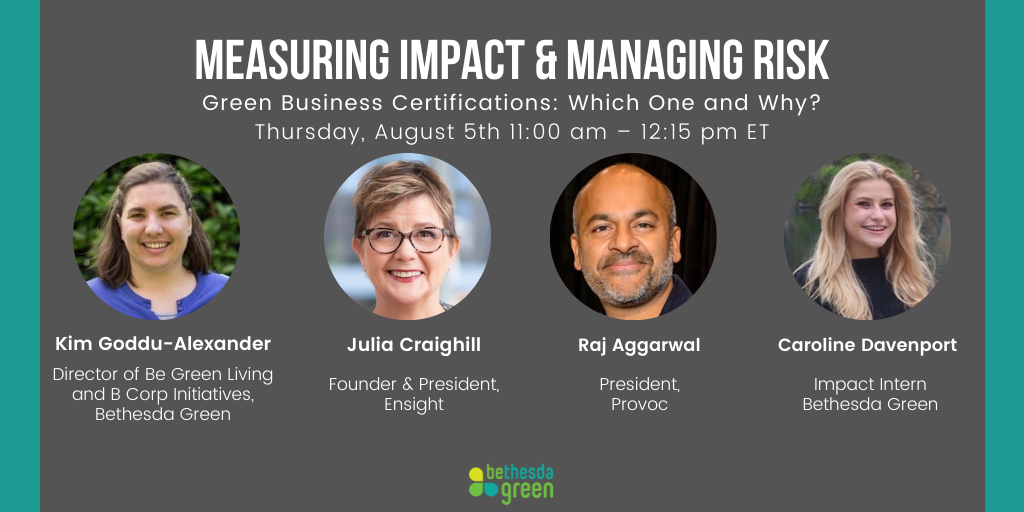2021 Summer Speaker Series: Tackling Environmental Challenges Through Sustainable Entrepreneurship
Building off the success of last year’s summer speaker series, Bethesda Green’s Innovation Lab is once again bringing together founders, industry experts, and policy makers for a series of conversations that will inspire and educate all who attend.
During our 2021 Summer Speaker Series, 14 industry experts are coming together to discuss two primary topics: 1) Building Sustainable and Ethical Supply Chains and 2) Measuring Impact and Managing Risk.
The following is a summary of the third session hosted on Thurdsay, August 5, 2021
Session #3: Green Business Certifications
Panelists:
- Julia Craighill – Founder and President of Ensight
- Kim Goddu-Alexander – Director of Be Green Living and B Corp Initiatives, Bethesda Green
- Raj Aggarwal – President, Provoc
Watch the full session on YouTube here:
https://youtu.be/04MmMLjLgaw

For this conversation, we brought together industry experts to discuss the role of green business certifications in helping companies demonstrate their commitment to the values their stakeholders hold dear, build brand loyalty, and increase their investment attractiveness. Our panelists included Julia Craignill, founder and president of Ensight, where she helps businesses make greener choices to reduce ecological impact and demonstrate corporate responsibility, Raj Aggarwal, President of Provoc, a B Corps public relations firm that helps clients translate their goals into measurable impact through strategic and creative partnership, and Kim Goddu-Alexander, the Director of Be Green Living at Bethesda Green where she manages community-focused projects and advises local companies on obtaining B Corps certification. Below, please find a collection of some of the key takeaways from this conversation.
There are a myriad of green business certifications out there, and it seems like more are popping up every day. The assortment of options can be confusing and overwhelming for both companies and consumers who are trying to make responsible decisions. As we spoke with our guests, it became clear that the most important factor for any company to consider when choosing a certification is whether a given certification aligns with the company’s values and goals. After all, while a company can reap plenty of benefits when it’s recognized for the good work that it does, there are also costs associated with certification that should not be overlooked.
In recent years, the number of green business certifications has risen significantly, and now includes many single attribute certifications that focus on one specific component (for example, packaging). This means that companies of all sizes and in all industries can likely find one directly relevant to their market or industry. For companies seeking certain types of contracts, an internationally recognized certification may be necessary and companies should check with the International Organization for Standardization (ISO) for information. A company’s customer base may also prefer that the brands they support obtain a specific certification.
An increasingly recognized certification is B Lab’s B Corps certification. B Lab’s Theory of Change emphasizes three thematic areas: racial equity, climate justice, and a stakeholder-driven economy. This is a multi-attribute certification that focuses on a company’s entire business model and value chain.
In addition to international certifications like B Corp, local certifications can play an important role in a company’s sustainability strategy. Julia Craighill has been a consultant for the Montgomery County Green Business Certification Program for the past seven years. She shared that a free local certification may not only be more accessible for smaller companies with fewer resources, such a certification can help companies signal their commitment to the well-being of their local community and enable it to become a preferred vendor for local government contracts.
Green business certifications are one way for companies to “walk the talk” and live out their values. On the external side, certifications signal a company’s commitment to sustainability and responsible governance. Stakeholders can believe this commitment because the data required for certification is verified by a third party organization. On the internal side, the process of obtaining certification requires a data-driven approach to evaluating performance that reflects on a company’s values and practices, and can help a company plan for continuous improvement. Companies that pursue certification can also frequently find coaching and consulting services to help them meet a certification’s requirements.
Certifications can also offer a competitive advantage by helping a company differentiate their product or service, which helps attract capital, recruit and retain employees, and build brand loyalty with customers. Obtaining a given certification can also help a company connect to a network of like-minded companies from which to learn and grow.
Yet for all the benefits a green business certification can unlock for a given company, such an effort is not without its challenges. A major challenge for many companies is that many consumers are not yet aware of the many certifications that exist today, beyond the easily recognizable Fair Trade Certified, USDA Organic, and Non-GMO labels. Companies that choose to pursue a certification should take advantage of the opportunity to proactively educate their consumers and stakeholders on how they implement sustainable and ethical choices in their value chain in order to anticipate and respond to consumer demands.
Certifications can also require substantial resources to obtain, which can be a particular hurdle for small businesses and early stage startups who may lack the staff, funds, or time necessary to collect and report data. Since the benefits that a company derives from obtaining a green business certification may not necessarily include a short-term economic payoff, young companies that choose to pursue certification do so recognizing that they are making an investment in their future. Yet to many founders, including Aggarwal, certifications represent much more than a box to be checked. Rather, certifications are an accountability mechanism. Craighill added that they are a means of raising consciousness amongst consumers. That building awareness is key to fighting climate change.
Our expert panelists concluded the session with a few words of advice for founders. Goddu-Alexander encouraged businesses to ask for help if they are unsure where to start. Local governments often have dedicated staff like Craighill to guide businesses through local certification programs. Aggarwal advised founders to share their green efforts, large and small. He also noted that even if a company does not end up getting certified, it can still use the free resources and tools that certification organizations provide, such as the B Lab’s B Impact Assessment, to benchmark its performance and develop strategies to improve. Finally, Craighill offered that it’s better for a lot of companies to make progress imperfectly than it is for a few companies to do things perfectly. That ultimately, even small efforts have an impact when multiplied by thousands.
Not quite sure where to begin? Check out Bethesda Green’s list of Green Business Certifications and this excellent resource from the Green Business Bureau about how to choose the right green business certification for your company.
See recordings and read summaries or other sessions from Bethesda Green’s Summer 2021 Speaker Series: Tackling Environmental Challenges Through Sustainable Entrepreneurship here:
Learn more about our upcoming panels and register here.
About the Authors:
Caroline Davenport joins the Bethesda Green team as the Innovation Lab’s Impact Intern. She will graduate in December 2021 from the University of Maryland with a Bachelor of Arts in Public Policy and minors in Spanish and Sustainability.
Patty Simonton is the Director of Be Green Business at Bethesda Green, where she manages the Innovation Lab.





